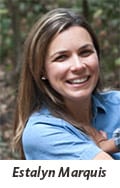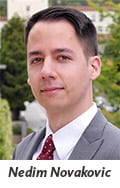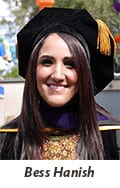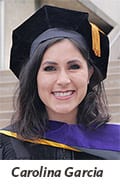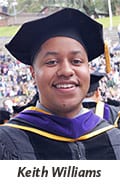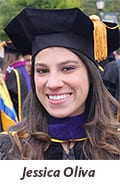The 2016 graduating class has earned one of the highest numbers of clerkship placements in Berkeley Law’s history. Here are some of their stories.
Estalyn Marquis ’16
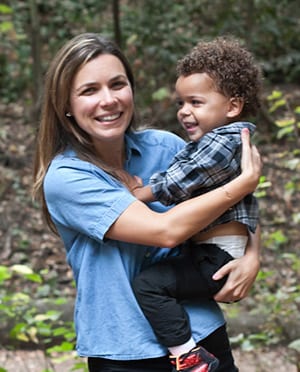 Clerking for: Judge Nannette Jolivette Brown, U.S. District Court for the Eastern District of Louisiana (New Orleans, LA 2016-2017); Judge Roger L. Gregory, U.S. Court of Appeals for the Fourth Circuit (Richmond, VA 2018-2019)
Clerking for: Judge Nannette Jolivette Brown, U.S. District Court for the Eastern District of Louisiana (New Orleans, LA 2016-2017); Judge Roger L. Gregory, U.S. Court of Appeals for the Fourth Circuit (Richmond, VA 2018-2019)
Growing up in New Orleans, Marquis and her family spent a lot of time eating and talking. “My parents (one conservative, one liberal) spent countless hours discussing and debating the things that matter most with me and my brothers and sisters,” she said. After Hurricane Katrina, while working as a teacher and special education coordinator, Marquis gained an appreciation of how law and policy affected colleagues, students, and neighbors as they struggled to reestablish themselves. In retrospect, she said, “my experiences during that time set me on the path to a career in law.”
Marquis gave birth to her son, Oberon, the summer after completing her first-year exams. “Returning to school with a baby was intimidating at first,” she said. But with the support of her husband and the Boalt Parents Network, she not only returned, but excelled. In addition to working with the International Human Rights Law Clinic, the Foster Education Project, the California Law Review, and the Warren Institute, Marquis externed with former Berkeley Law Professor Goodwin Liu on the Supreme Court of California, and with Judge Edward Chen ’79 of the Northern District of California.
Marquis credits her judicial externships during law school for preparing her for the challenges and rewards of working as a law clerk. “I’m humbled to have the opportunity to work for such inspiring jurists,” she said. “Judge Brown’s work on behalf of my hometown and the state of Louisiana was especially inspiring to me.”
As for the future, Marquis cites the advice of “a wise professor” Melissa Murray, who’s now serving as the interim dean: Don’t be afraid to think differently and to challenge assumptions about what’s possible. “Oberon can already say ‘harmless error’ and ‘objection, hearsay,’ so who knows? Maybe, I’ll be attending his graduation from Boalt one day.”
Nedim Novakovic ‘16
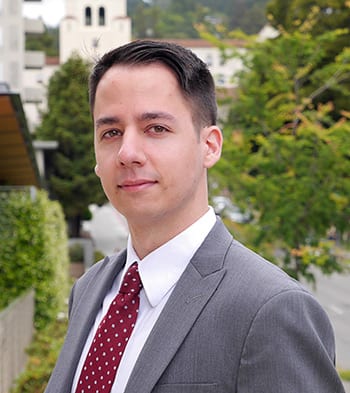 Clerking for: Judge Stephanie Rose, U.S. District Court for the Southern District of Iowa (2016-2017)
Clerking for: Judge Stephanie Rose, U.S. District Court for the Southern District of Iowa (2016-2017)
“I decided to pursue law as a career because the law is so central to issues that everyday people face, like job terminations or a potential eviction,” said Novakovic. As Bosnian refugees—Novakovic, his mother and brother came to America 16 years ago—these issues were daily struggles for his family. “When we hit a road bump, I’d always wonder what our options were and how we could exercise them.”
During his time at Berkeley Law, Novakovic applied his drive to help low-income clients while working at the Workers’ Rights Clinic at the East Bay Community Law Center (EBCLC). He recalled representing a client in an employment-law matter before an administrative law judge. “We ended up winning him the money he needed, and I can still remember how happy he was for my help even though my work was just the usual routine at the clinic,” Novakovic said. “I keep the court’s opinion around to remind me that it was a first good win among, I hope, many to come.”
Novakovic was also a member of First Generation Professionals and an active member of Berkeley Journal of Employment and Labor Law, Berkeley La Raza Law Journal, and California Law Review, which published his article, “Access to Justice: Reducing the Implicit Pushback Burden on Working-Class Pro Se Plaintiffs in Employment Law Cases,” in the April 2016 issue.
In addition to the strong preparation he received through his work at the EBCLC clinic and externing for Judge William H. Orrick at the U.S. District Court for the Northern District of California, Novakovic cites the “unique and empowering” Berkeley Law faculty.
In the classroom, “there’s a strong focus on the social implications and policies behind the law,” he said. He added that students participate not only in discussions about the law’s application, but also in conversations about if, why, and how the law should change. “Three years of this has enhanced my ability to analyze the law in depth, which should come in handy during the clerkship.”
Novakovic’s innate perseverance will also serve him well. “We came to America after the war in Bosnia with only a suitcase or so of belongings and didn’t even speak English,” he said. “Graduating from Berkeley Law represents all of my family’s immeasurable hard work and sacrifice. I’m truly grateful for this invaluable opportunity.”
Bess Ibtisam Hanish ’16
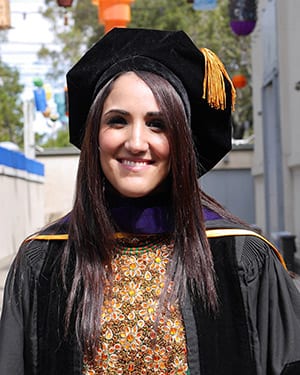 Clerking for: Judge Matthew F. Kennelly, U.S. District Court for the Northern District of Illinois (2016-2017); Judge Morgan Christen, U.S. Court of Appeals for the Ninth Circuit (2017-2018)
Clerking for: Judge Matthew F. Kennelly, U.S. District Court for the Northern District of Illinois (2016-2017); Judge Morgan Christen, U.S. Court of Appeals for the Ninth Circuit (2017-2018)
Bess Hanish has come a long way since making the difficult decision to leave her deeply conservative family of Yemeni-Muslim immigrants to avoid arranged marriage and pursue her education eight years ago.
She has interned at the White House and the State Department, earned a Truman Scholarship and a Paul & Daisy Soros Fellowship for New Americans, and enrolled at a top law school. “At Berkeley, I had the opportunity to pursue what many in my community were unable to,” she said. “I hope to be an example for the girls I left behind.”
Although Hanish has focused largely on academics, she was part of the student chapter of the International Refugees Assistance Project that helped an Iraqi translator for the U.S. military and his family find safety in the United States. She also served as academic chair for the Women of Color Collective and as articles editor for the Berkeley Journal of Gender, Law & Justice. In addition, she found time to intern at the Department of Justice’s Civil Rights Division and the ACLU of Northern California, and worked as a summer associate at Boies, Schiller & Flexner.
Despite her busy workload, Hanish made it a priority to balance personal well-being with academics. “As a financially independent student, first-generation professional, and daughter of immigrants, I put a lot of pressure on myself to succeed because I knew no one would be looking out for me—but me,” she said. At Berkeley Law, she found a community that emphasized that the intellectual rigor of law school “does not have to be synonymous with all-nighters, anxiety, and competition.”
“As I walk across the stage at graduation, I will feel immense pride that my sisters will be in the audience—both of whom have since returned to school,” Hanish said.
Carolina Garcia ’16
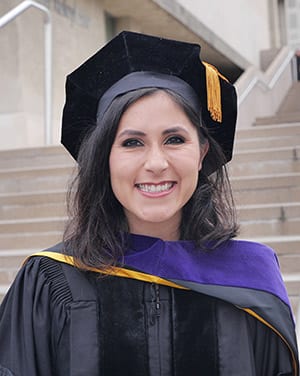 Clerking for: Magistrate Judge Nathanael Cousins, Northern District of California (2016-2018)
Clerking for: Magistrate Judge Nathanael Cousins, Northern District of California (2016-2018)
A first-generation American and single parent of a 9-year-old son, Garcia had not considered applying for a clerkship before working as a judicial extern during her final year of law school.
“Working as a judicial extern, I found that I loved the work and relationship between a judge and clerk,” Garcia said. She was familiar with Judge Cousins, having attended a high-profile trial he presided over. “He struck me as a very fair-minded judge with a lot of patience” for stakeholders and jurors in a very difficult case, Garcia said. When she heard he had an opening in his chambers, she jumped at the opportunity, securing a rare placement in her 3L spring term.
In addition to the experience she gained as a judicial extern, Garcia pointed to the practical skills and clinical offerings at Berkeley Law as invaluable preparation for the job of a law clerk. “By working at EBCLC, I learned to put myself in the place of a litigant by representing clients before an administrative law judge.”
While honored to be chosen for a clerkship, Garcia is most proud of her own transformation during the three years of law school. “Like many of my classmates, I suffered from ‘imposter syndrome’ when I was admitted to Berkeley Law. Simply put, it’s the feeling that when you were accepted into this school, it was a mistake and you don’t deserve to be here. I’m graduating with the certainty that I not only deserve to be here, but also that I’m a credit to this school.”
Keith Williams ’16
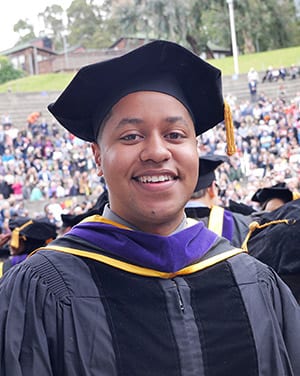 Clerking for: Judge Gerald Bruce Lee, U.S. District Court for the Eastern District of Virginia (2016-2017)
Clerking for: Judge Gerald Bruce Lee, U.S. District Court for the Eastern District of Virginia (2016-2017)
Growing up in a multicultural family in an agrarian part of Northern California, Williams experienced a wide range of socioeconomic perspectives that sparked an interest in business and finance. But it was the advice of teachers at the Jesuit school he attended during his formative years that ultimately led him to a life in the law.
“The teachers emphasized that we were supposed to grow up to be “men for others,” meaning that we should serve others as opposed to ourselves,” he recalled. After studying finance as an undergrad, he decided to pursue a JD/MBA to launch a career in consulting. Knowing he ultimately wanted to practice in California, Williams chose to come to Berkeley Law as a transfer student after spending his 1L year at a midwestern law school.
Here, Williams said, he found his niche.
“Taking Professor Aaron Edlin’s antitrust class really altered my career path,” he said. A career in antitrust litigation would allow him to apply his passion for the law while also satisfying an interest in business strategy, he added.
After working as a summer associate at a litigation firm and at a judicial externship in the Northern District of California, Williams’ focus narrowed, and pointed directly to Judge Lee—an “innovative and well-respected trail attorney” before becoming a judge.
Williams said he is excited for the challenges and rewards of grappling with complex legal issues as a law clerk, but more so for the opportunity to learn how to “become a polished litigator” from the judge himself.
After concluding his clerkship, Williams plans to return to litigation, with an emphasis on the intersection of antitrust and intellectual property. He’ll also pursue pro bono initiatives that address issues involving education and civil rights.
“I’ve learned a lot about myself and the society we live in,” he said of his journey through law school. “I am looking forward to using my Boalt degree to make a difference.”
Jessica Oliva ’16
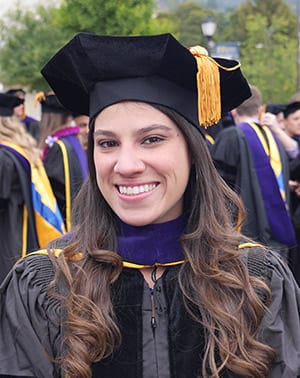 Clerking for: Chief Judge Barry Ted Moskowitz, U.S. District Court for the Southern District of California for (2016-2017)
Clerking for: Chief Judge Barry Ted Moskowitz, U.S. District Court for the Southern District of California for (2016-2017)
As the daughter of immigrants, Oliva has a predisposition for perseverance.
“From a young age, I watched my parents succeed amidst adversity,” she said. “Every time I felt overwhelmed by the pressures of law school, I thought of them—I thought of their sacrifices and of how much my graduation day would mean to them.”
She decided to pursue a career in law because, growing up, her family struggled with legal issues without an attorney that understood her family and community and could truly represent their needs. “I began realizing that our story was not that unique, and I wanted to help individuals find a voice within our legal system.”
Oliva, a UC Berkeley graduate, said that when she received her admission letter from the law school, “there was absolutely no question that I wanted to join a community of students and professors dedicated to helping marginalized and disenfranchised communities.”
She quickly took on leadership roles within the Berkeley Law community, serving as co-chair of the Women of Color Collective and board member for La Raza Student Association. Oliva also helped draft the International Human Rights Law Clinic petition filed against the U.S. before the Inter-American Commission on Human Rights on behalf of the family of Anastasio Hernández Rojas, who was killed by agents of U.S. Customs and Border Protection.
“I will be forever grateful for the opportunity to help Anastasio’s family continue to fight for justice,” Oliva said.
Oliva will spend her first year after graduation clerking for Judge Moskowitz in the Southern District of California. “From observing his proceedings, it didn’t matter whether it was a straight-forward sentencing hearing, Judge Moskowitz took the time to allow all parties to present their arguments. I could tell that he was the type of judge that truly afforded everyone their day in court.”
With her already robust record of advocacy and fighting for justice, and a residence with a judge dedicated to the same, there is no doubt that Oliva will dedicate her career to improving the communities around her.
